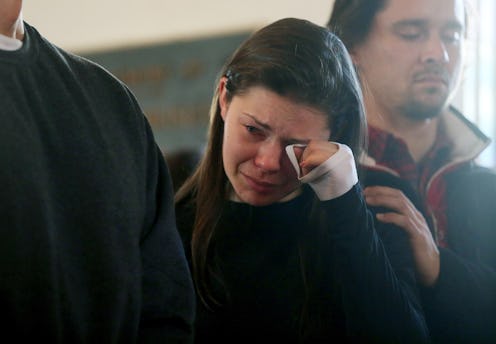News
Sandy Hook 911 Calls Released
On Wednesday afternoon at 2 p.m., 25 minutes' worth 911 recordings from the Sandy Hook Elementary shooting in Newtown, Conn., were released. Adam Lanza’s shooting spree inside the school on Dec. 14 last year killed 20 children and six adults, and was the second-deadliest mass shooting in U.S. history, and seven calls placed during his rampage are now publicly available. The tapes comprise only calls made to local police — those made or routed to Connecticut police remain in the state’s hands.
The tapes encapsulate the panic and chaos experienced during the massacre, but emergency respondents kept calm, telling callers to take cover while getting police to the school. "I caught a glimpse of somebody," one of the first callers, a woman, said. "They're running down the hallway. Oh, they're still running and still shooting. Sandy Hook school, please."
One of the calls, placed by custodian Rick Thorne, lasts for 10 minutes as Thorne runs through the school to alert people, before being urged to take cover and then cut off by the Newtown police who arrived on the scene. "There's still shooting going on, please!" he said. Gunfire in the background. "Still, it's still going on!" During Thorne's call, the dispatcher told a colleague to get "everyone you can going down there."
A dispatcher tells one teacher who called to say she heard gunshots in the hallway to "keep everyone calm, keep everyone down, keep everyone from the windows." The teacher was injured. "Are you okay right now?" the dispatcher asked. "For now, hopefully," she said.
Newtown School superintendent John Reed emailed parents earlier to warn them about the tapes' upcoming release. The recordings reflect the depth of the tragedy: In some, gunfire peppers the background of some of the audio-enhanced calls.
The Associated Press had been asking for a chance to go over the tapes since shortly after the shooting took place. Local officials and a state prosecutor, Steven Sedensky, tried to block the calls’ release by delaying the Commission’s decision on whether to release them. Sedensky argued that the massacre was a case of child abuse — if they qualify as such, 911 calls aren’t made public — and that the calls were a type of signed witness statement.
But last month, Judge Eliot Prescott ruled that because emergency calls are a matter of public record — even the 9/11 emergency calls were released — they cannot be withheld from the public. Just a few days ago, prosecutor Sedensky ultimately dropped the case. In the end, Newtown town officials also dropped their attempt to stop the release of tapes: one even reversed her position, calling on the tapes to be released in full so that bits and pieces of the tapes weren't leaked.
“We all understand why some people have strong feelings about the release of these tapes,” AP executive editor and senior vice president Kathleen Carroll said. “This was a horrible crime. It’s important to remember, though, that 911 tapes, like other police documents, are public records. Reviewing them is a part of normal newsgathering in a responsible news organisation.”
A poll on the Albany Times-Union site asked readers if they wanted to hear the tapes. Fifty-four percent said they believed the tapes should be kept private while 38 percent said that they were "curious" about anything that might help them "understand that tragedy."
